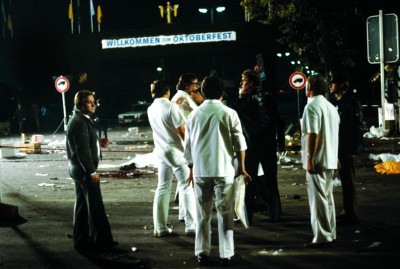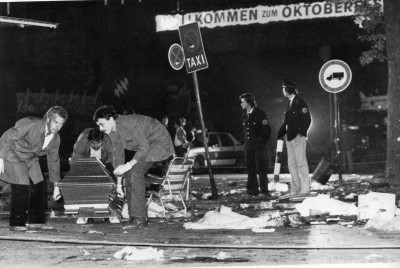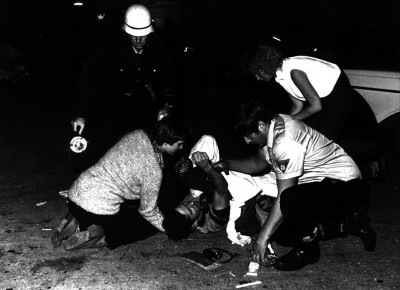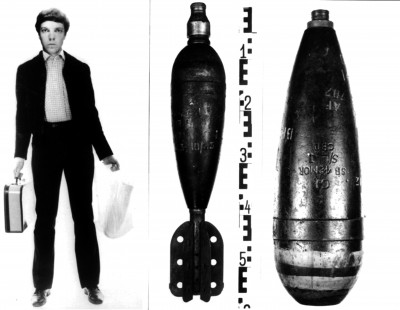What an ending. It made me smile. And shortly after I thought: Is our conversation now heading towards universal, romantic Love for the world? Phew. We are neither often lovers nor often in this world nowadays, I´m afraid. We are always here and somewhere else at the same time. Our current habits of digital communication and thus a whole communication industry only show that human beings almost cannot bear to be at one place at a time anymore, with one person at a time, experiencing only one moment or event at a time. We are not being sold contracts for phones anymore, we are being sold pseudo-sensual “connections“ to the ones we care about, to events we love – because we are in the world when we love things? Thumb-up-Love called „Likes” on Facebook? To be a lover in such an abstract sense, as beautiful as it sounds at first, bears the danger to turn us all into 24-hours-enthusiasts – though enthusiast I actually often love. And yet I wonder: Are we really capable of being lovers in your definition, meaning Lover = To be in the World? Why are we so easily leaving the world we are in, as if we had nothing valuable to lose? And now I am returning to your first rather love-deconstructing thoughts. Back to that love-projecting activities people call love, the kind of love that you talked about when we started. Those people that on the surface seem to be unhappy due to love. Or are they unhappy due to a lack of self? This absence of the Self can so easily and effortlessly be changed the moment one falls in love. Falling in love to many means projecting completion into someone else. It was like that from our very first myths and explanations we told each other about love: This half that we are missing. It was always a pitiful narrative: I am missing my half and the other one is missing his half. Two sad halves are wandering round that flat planet called earth. All of this never contained the thoughts: I wonder if the other half is unhappy without me. The perspective was always that two individuals cut in half worried about their unhappiness. As if we are always concerned about ourselves and our completion when we think about Love: Me and my need to become what I was meant to be. Me and my need to feel what I desire to feel. To become what I want to be. Then we meet someone who provides us with enough distance so we can project all this longing onto him/her. We grow into that relationship, into that imagined completion, we grow into who we think we can become. And as soon as we are there, another longing pops up, another desire of what we want to be drives us. We do not grow complete through love, we grow incomplete in another way. I think Love has always been – and nowaday even more so – a vehicle of personal growth to many. A vehicle for the ideology of personal growth. That person is not who I thought he/she would be. Which means: She doesn´t make me feel the way I wanted to feel. And then? Is that question the beginning of real love or the unmasking of unreal love/self-search? The abstract term „lover“, as you defined it, loses its universality the moment it refers to a specific „lover“. It focuses, narrows down. And even if it doesn´t, what happens to us if we really feel completed next to someone? Is that the moment we start being possessive? Fearful? Creatures afraid of loss and abandonment? What if I simply don´t want to lose is that sense of Self I acquired through the Other? Possession? Can we talk about love without talking possession – in a double sense? Ownership and the mental state? Do we really want to posses the other or rather what we think we can be in relation to that other?
So this is the setting. The Oktoberfest at night, the exit with the arching sign overhead, a mass of people. The question is: What to do with it, artistically, politically, intellectually. The politicians decided very quickly what to do: They buried the case. They suggested leftist terrorists behind the plot for a short while and then, as right-wing connections became more evident, they shut the case claiming that it was the lone Köhler who commited this atrocity. It would have been too much to bear to have a right-wing conspiracy, escpecially in Bavaria, where things are always better than in the rest of the republic. But the fact remains, the dead remain, they even, as dead often do, resurface. There are new investigations into this crime, there is evidence of a cover-up, there are piles of testimonials that have never been read, there are, and this is what stayed with me most, 47 cigarettes that were found in the car of Köhler, from six different brands, with and without filters. It seems not very likely that Köhler smoked them all himself, six different brands, with and without filters. It points to the fact that he might very likely not have acted alone. And today it would be easy to look for DNA on the cigarettes that would help identify anybody in the car with Köhler. 47 cigarettes. What to do with them? Artistically, it might be a good idea to smoke them with the audience at Lothringerstraße 13, the art space where we are invited to to a presentation on the subject on October 6. Politically or at least police-wise, the answer was: Destroy them. They had been stored to a while together with other evidence, among other things a hand that had been torn off at the blast and was never claimed by any victim and could also not be identified to any victim. All was discarded a few years back. So no evidence in this direction. But like with all catastrophes, the imagination is larger than any evidence. The interesting thing is: I am not sure how present the Attentat is still in Munich memory, in the memory of the place, in the body of the city so to speak.
Christopher and I did this research concerning the years 1980 and 1981 as important years of a shift overlooked by most historians, tendencies that were still in the stage of latency or out in the open but overlooked: end of Communism, end of Capitalism, haha, well, sort of, more like the beginning of radical Capitalism, the rise of radical Islam. And there were other, smaller stories. Like Bologna, where everybody thought the bomb had been planted by left-wing terrorists and where the police and the politicians acted accordingly. A lie maybe more than a truth generates something that in turn becomes undeniably a fact, a truth so to speak. The assassination attempt on Pope John Paul II was such a case where the myth of him being saved by the virgin Mary became so strong that it made him change his policy towards the Soviet Union. Christopher and I restaged and reenacted this event many times, in Zurich, Hamburg, New Delhi among other places. It was always something not quite cathartic, something fun and relieving and at the same time a bit humbling, serious. Like world history turned into a birthday party for an eight-year-old. This is what we want to do with the Oktoberfest Attentat. Sometimes there seems to be an act of exorcism in our work. Not in this case though. It is more about waking up the ghosts.

September 26, 1980 – in Munich a bomb deposited in a trashcan at the entrance to the Oktoberfest kills 13 people and injures 219, many of whom lose limbs in the explosion. The bomb detonates at 10:20 p.m., just as thousands of visitors are crowding toward the exit. It is beyond dispute that Gundolf Köhler, a university student from the Swabian town of Donaueschingen, made the bomb, took it to Munich and deposited it at the scene of the crime. He is killed, because the bomb goes off too soon.


But even 30 years later his motives will remain unclear. Was he a crazy perpetrator who was acting alone, or did an extremist right-wing group stage a terrorist attack against Germany just nine days before parliamentary elections? The student had ties to Wehrsportgruppe Hoffmann, a neo-Nazi organization banned on January 30, 1980. Köhler had taken part in their exercises. Is it really a coincidence that Frank Lauterjung is at the scene of the crime? The key witness to the attack is also a right-wing extremist and he might have been also an informant for Germany’s domestic intelligence agency. Lauterjung survives the explosion, even though only a few meters away, because he has a “bad feeling” and throws himself to the ground before the bomb detonates. Investigators questioned Lauterjung at least five times. He will die of heart failure in 1982, when only 38. Lauterjung tells investigators that he noticed Köhler in a loud discussion with two men in green parkas near the site of the crime, about 30 minutes before the explosion. The two men were not among the victims. What the investigators overlook is that Lauterjung is an avowed right-wing extremist. Previously unknown letters, discovered as part of a deceased person’s estate, will reveal that in the mid-1960s Lauterjung was in the Bund Heimattreuer Jugend (BHJ), where he served as ‘deputy national leader’ and ‘regional commander.’ Members write ‘Heil Dir!’ as reference to the ‘Heil Hitler.’ A BHJ leader suspected that Lauterjung had infiltrated the organization, and that he was possibly working for Germany’s intelligence. He would sometimes “disappear for four weeks at a time, as if he had been wiped off the face of the earth.”


Shortly after he was kicked out of the BHJ, Lauterjung joined the Socialist German Student Union (SDS). Was he following Köhler? Lauterjung claims that, as a gay man, he was looking for sex at a public toilet at the entrance to the Oktoberfest. Lauterjung also says that he believed Köhler was doing the same thing. According to Lauterjung, Köhler was carrying a heavy, cylindrical object in a white plastic bag and a small suitcase. The suitcase disappears without a trace, even though other witnesses say that they have seen it immediately after the bombing. A female passerby says, two young men were standing next to Köhler’s body, shouting: “I didn’t want it! It’s not my fault! Just kill me!” Another woman says that she saw a car with five passengers near the entrance to the Oktoberfest a week ago, just after it was opened. There was a large object wrapped in black material on the back seat. The woman even remembered the license plate: VS-DD 500, a Ford owned by Köhler’s father.


Not even a trace of the detonating device is found among the pieces at the site. The investigators assume that a faulty fuse had caused the early detonation.

In a 1984 novel, Wehrsportgruppe founder Karl-Heinz Hoffmann will write that the Oktoberfest bomb was detonated by remote control. Are the backers even from Italy? A few weeks before the Oktoberfest bombing, right-wing extremists killed 85 people in Bologna train station. Munich papers receive calls claiming responsibility from “right-wingers in Bologna.”


It’s a way of seeing. I recall what you said about the American Apparel Ad, the staging of men in position usually occupied by women, its seeming unworkability – which arises from the strangeness of seeing men occupy a position that is not theirs, so to speak. This and in a way what you say of Gambia is a reason I detest a certain kind of “feminist,” whose notion of liberation means women positioning men in ways long occupied by women.
That is to say, the legitimization (by women) of women as bitches. In response to the deliberate invisibility of the female gaze, yes, I do think that male and female erotic responses to visual stimuli are culturally conditioned. What you say about your mother and her friends reminds me of a story my mother told me some time ago: The first time she set eyes on my father’s village champion wrestler. (My mother is from the coast, so the concept of half-naked men engaged in wrestling was alien to her.) She was twenty and newly-married. What a sight he cut: His loin-cloth barely covering his heavy buttocks, and the women of the village chanting praises a safe distance behind.
So, yes, I think Kinsey’s female non-erotic response to visual stimuli is not biological. I want to pursue Gambia a bit further. To challenge my preconception, if I accept prostitution as an act of violence a woman commits against herself for material gain, am I merely reconfirming a mindset? Do I see male prostitutes in this light? Is male prostitution also an irreparable damage, an irreversible destruction of a human body? Are male and female commercial sex the same thing? I think it’s safe to say that with both male and female prostitution, men and women are both mauled by the reduction of sexuality and sexual fulfillment to having as many orgasms as often as possible.
Part of the thrill of commercial sex, at least for men who use the services of female prostitutes, is the power play. Is there, I wonder, a transfer of power to these women who go to Gambia during the sexual encounter? This takes me back to Milbrath’s photos and how men and women are sexually positioned: Is it about what could be done to this male body, or what this body could do to them – for these pleasure-seeking European women? In what way does the fact that, historically, men have held a sexual dominance affect our perception of male prostitutes? Is not our general perception of men in society one of power, domination?
Do we ever look at these Gambian males as being exploited by the European women – because of their material circumstances – the same way we’d look if they were female? I find it really interesting, your experience in Gambia, your use of market terminology. In a market driven society, form is usually passed off as content. Since naked cash is the sole nexus between individuals, what common ground could exist between men and women except as buyers and sellers? Again, on the legitimization by women of themselves as bitches. Does the availability of commercial male bodies – in strip clubs and the Gambia – signify the arrival of equality, liberation?
I can understand why the male strip club did not work for you, the same way commercial male sex did not. Neither signified liberation, but rather a buying into ugly reality. They do not in any way challenge our reality. I do wonder, however, to reference the Völkerschauen, if a modified version of it is enacted on the beaches of Gambia and Mombassa. It seems to me, these sex tourists who come to the Gambia are more comfortable with black males they can lead around with an invisible leash and make to perform. (I find what you say about the Völkerschauen really interesting.) It is possible to agree with Freud – in reference to your comments about the cliche of the female need to shroud herself with darkness, her need to hide her desire – that every sexual act is “a process in which four persons are involved.”
One can extend this to also include the preconceptions about ourselves and each other both sexes bring to the act. The one responds to the other – during the act – not truthfully, but according to his/her own externally-imposed preconception. Identity is constructed from birth. It is safe to say that, distance tend to develop between women and their body. This distance is culturally constructed. In a way, I think this is expressed by the myth of Immaculate Conception: the construction of female sexuality in reproductive terms – to exclude the vagina and clitoris.
A woman, what is she? A womb, an ovary. As an aside, I’m thinking of Jamie McCartney’s The Great Wall of Vagina. To what extent does it speak to female shame to never go down there?
It is possible that to the traditionalist-minded, McCartney’s images (so unlike the astonishing leveling out of uniqueness in porn’s designer vaginas), from the most intimate world of women, which had always remained hidden from the eyes of women themselves is an excursion to the dark side of art. A person can either submit to this imposed identity, or seek to reconstruct herself on her own terms, to resist all attacks against her sense of self. (It must be said, however, that easy access to male flesh – on ‘female terms’ – and the staging of the male body does not in anyway constitute resistance to attacks against self.)
With Milbrath, there’s no attempt to go beyond the surface, to look beyond stereotype. There’s, in this gaze, no questioning. My reality of being male is not validated by mainstream imaginings of men. I’d managed to hang on to my own sense of self all through the crisis of adolescence and the pressures to conform. It is for this reason I make my male protagonists deliberately feminine. (The most powerful men are men who are not afraid to be feminine. Machismo is cover for insecurity.) I’d translated my discontent into new images with which I seek to undermine conventional perceptions of black male sexuality. For me, it’s not just the sex. I particularly like the shared silence, the talking, and the taking breaks, the nonsexual caresses.
I like that it is not just the sex. The commodification of love expresses itself in the fetishization of sex, that is, sex stripped of its human quality, stripped of tenderness. To accept this is to accommodate oneself to a life without beauty.
Alexine loves patterns. She makes patterns that soften the world’s inherent hardness. It and she are a subtle solution to problems that you were only vaguely aware of only until it all becomes very clear. Her and the patterns are about joy in the end. You can sink in or bounce softly back on your feet as she does.
Which would mean that “lover” is an abstract term that can be applied to very different circumstances. It would cover the intimate moment in the cinema with the daughter and the glimpse of a woman passing you on the street, the movement of a body, a strain of hair, cheekbones, it can be the wife or the husband in a sexual way that goes beyond the routine of marriage, it can be the exception of the rule or just the foolish notion that you can break free from the limitations of time and life, for this one moment, for this one night, it can be a story you like to believe in or a cat or even a tree. There is a liberating aspect to this interpretation of the word “lover”. It ignores any preconditions of what may or may not be appropriate, it ignores the limitations of love which is defined by sex and opens it up to this at the same time. It all comes down to one word, a contradiction, I would still claim, because really it is more a wish than a real possibility: intimacy. There is always a boundary that seperates you from one another. Love might in the end always be self-love, which might not even be a problem. Everything else might be a delusion. You get something from loving but not really what you expect or want. You get something from being loved but not necessarily what you are looking for. In a way “lover” could thus be an ideal state of mind. It is more about the idea of love and less about its physical manifestation. It is about a sensual connection to the world, about listening and looking. To be a lover means to be in the world.

I like your first remark, it makes me think of how situations and subjects become invisible by our preconceptions. So, even though they exist in real life they are doomed not to matter. I have no doubt that women were always gazing and desiring men. They were just not encouraged to do so. The female gaze was made invisible and a deliberate blind spot of society, in order to uphold hierarchies about who was empowered to desire and herewith control the other sex. But the “blind spots” of my own gaze got awfully clear to me, once when I was traveling through Gambia. Gambia has a reputation now of European women seeking male prostitutes.
When I was there about ten years ago, I was approached by men in that way but I couldn’t see myself as a customer of people who prostitute themselves. I didn’t understand the signs. It took me a while before I actually got that they wanted me to be their “sugar mommy.”
It was all very confusing. To understand that these men could see me as a customer of their bodies, their sexuality and somehow also of their integrity, was very alien to me. Because I never learned in our culture that I could buy a man. It reminds me of an article I wrote years ago for a daily newspaper in Germany about my experience in a strip show by men for women.
The whole event didn’t work out for me, because I was turned off: I felt awkward due to how staged that seemed. It was so clearly trying to create a market niche where women cheer at men’s bodies. There was nothing liberating about it, quite the contrary: instead of trying something new, it just copied a vulgar Ibiza-style. I couldn’t enjoy it, because my enjoyment would clearly buy into an ugly consumerism.
On the other hand my mother told me that she attended a Chippendale show with some girlfriends. She comes from a generation where this gazing was not permitted and encouraged (even though, of course, it took place among her girlfriends. My mother actually told me that she enjoyed going out with her girl-gang checking out boys much more than actually having a boyfriend). So her experience had an air of liberation and equality, instead of oppression and corruption. I enjoyed listening to her experience.
But that is, of course, just one side of the story. I think you are right with your observations on the Völkerschau: I want to add that, as Joshua Kwesi Aikins emphasizes in his research, the Völkerschau stopped in the 1940s not because they were seen as inhuman, but because some participants undertook some actions which were just too subversive for the German audiences:
E.g. some Africans compared the “tribal” dances they had to perform to the “tribal” dances in Germany – the Schuhplattler, some wore suits instead of “traditional tribal costumes” (which were, as well as the dances, of course, totally made up from German exhibitors’ imagination) – and, here it comes, looked back at the German audience with a lorgnette, an instrument which symbolizes sophistication, civilization and the arts.
All this exposed the vulgar racism of the Völkerschauen which thus could not pretend to be the climax of civilization. Africans looking back with a lorgnette put themselves in a position of higher culture than the Whites who rather behaved like going to a fairground attraction.
That, by the way, is a story totally ignored by the German history canon, where Africans – if they are acknowledged as victims of oppression at all – are hardly represented with their agenda and subjectivity. That also played into my confusion about Gambian male sexworkers.
I remember one night where a man in Gambia offered me his service and when I friendly declined he said, we could also make love without the penis. I found that offer quite remarkable and was wondering if it was something he liked personally or if this offer was accustomed to European clients of his sexwork, who want to be assured that the offered service is directed – with a focus on the clitoris rather than her vagina – at her pleasure.
As an assurance not to be penetrated by a man who might turn out to be selfish. Of course, it could also mean he thought that Europeans were scared of STDs. But also in relation to colonialism, poverty and sexwork, I find it very powerful when you say, through its myths, an image of male and female sexuality was produced that deprives sexuality of its humanity, because you indicate how the way we learned to gaze defines also our action and relation to each other.
A classic cliche is that women tell men to switch out the light when they have sex. She is too ashamed to be all exposed for the man to see her flaws (thus she perceives herself that she has to be the perfect object of his desire) and see her excitement about him.
Because she looks needy and horny, she is afraid that her arousal looks ridiculous to him. The act that is supposed to be about total pleasure and melting into each other, lust and togetherness is forbidden, she is stuck in her own self-consciousness. So, watching my boyfriend under the shower is an attempt to connect to him, maybe as an attempt to create true intimacy, when we overcame his shame.
And here, as well as with my experience with the male sexworker, we also come back to your question “Is a non-erect penis not part of male eroticism?” A question I really liked very much. It is the eroticism of expectation, surprise, exposure, the absence of danger or force, as well as the intimate honesty and care of someone who cannot “perform”.
A non-erect penis is an offer of intimacy without the force of a man’s will, exploring each other’s body, without the need of penetration (and thus avoiding the possibility of the man to totally take over, which is by the way exactly the point of a particular debate about rape: a woman’s NO has to be respected at all points of an ongoing sexual encounter, even if she consented in the beginning, for the man might turn out during the play to be selfish or rude or violent).
A non-erect penis can be an offer for more time and space and sometimes depth in a sexual encounter for there is no need for a specific play and an orgasm. Also it is the aftermath, the cuddling and warmth after sex, when we lie in bed all wet and happy.
And that also is a quality feminist porn has in store. It is much more diverse, than just focusing on the male body for a female audience. It also includes a lot of signifiers for women to feel safe and not objectified, for example, they show the use of condoms and the play with the clitoris.
The models don’t have to represent unrealistic beauty standards, it’s not too clean and sterile, and often transcend strict gender signifiers, utilizing imagery we didn’t expect. It’s about having fun and not being objects. It gives space for non-standard sex. Often the actors are being interviewed so you learn about their perspectives, why they like what they do.
This enables a whole turnaround of the cage of the clear-cut images of women being “taken” by men. Like my friend Bini Adamczak came up with the term circumclusion instead of “being penetrated”. It emphasizes a perspective of activity and sovereignty by women. A women circumcludes a penis.
Raphael, first of all, welcome to this exploring journey alongside the Bayern Munich team. I expect this season 14/15 to become the most important in the club’s recent history. Two reasons: The biggest factor for the team’s international rise since 2010 with appearances in three out of four Champions League Finals, winning in 2013, winning the Club Teams World Champions and the European Supercup, has gone – the legendary and uncomparable successful Uli Hoeneß has left Bayern, unfortunately because of some tax-trouble. Secondly: Pep Guardiola, in consequence of this, has taken control over the sportive branding of the Bayern Munich style of football, it seems. But what is his approach after a nearly satisfying first year, winning both national titles with Bayern, the Championship and the Cup?
Hoeneß always follows the idea of collecting the best German players and – ever since 2008 – enhance them with outstanding internationals like Luca Toni, Ribéry, Robben, Thiago, now Lewandowsky. Simple idea, hard to implement. The massive influence of Bayern Munich players during the World Cup that ended with an epic victory over Argentine in the final, proved Hoeneß right.
Pep Guardiola again has his very specific view on football. He reflects on the perfect length of the grass on the pitch, the beauty of the game, and he demands a pushy offensive, ball-possessing, best vertical, preferably one-two-touch football-concept. His philosophy, his taste for a three-defender-chain, a many-legged midfield without a true striker, is favored as the cherry on the cake of modern concept-football. Perfect for Barca. But perfect for Bayern, who broke the Barca-Code in their Champions League Campaign 2013? Thus far the Guardiola-Bayern have neglected the importance of Plan B: a more defense basic order, when needed. Real Madrid took advantage of that problem when it beats Bayern in both of the Champions League Semi-finals last season. I believe, if Guardiola won’t adjust to the unique qualities the Bayern Squad has always shown in controlling a match based on defensive order and resistance, he will not be as successful as he could be.
What confused me after the season’s start three weeks ago with a fishy draw at Champions League participant Schalke is the transfer-politics of late August. Guardiola tried to convince his loyal leader for many Barca years, Xavi, to follow him to Munich. Xavi rejected Guardiola’s plea, as he doesn’t ever want to fight against Barca. So, next step for Guardiola and the Bayern management was to sign Xabi Alonso. Xavi and Alonso played successfully together, as very diffferent, complementary players. What does this tell us about the strategic direction of the “new” Bayern Munich team? Alonso stands for more defensive controll in a traditional way. At the same time Guardiola is further experimenting with a three-defender-line, although he obviously is lacking the players for this experiment, first of all Martínez, and he, so far, isn’t counting on Badstuber, who can give structure to the game’s layout.
Still, there is plenty of injured worldclass missing such as Martínez, Thiago, Schweinsteiger. Still there is worldclass that has to be kissed alive such as Götze. Already I can say, that Dante is facing his last season with Bayern, as Benatia has not been bought for 30 Million Euros as an additional force. I believe, that Lahm is better the best rightback in football’s presence than a Guardiola-solider in the rear midfield, responsible for the buildup. There is worldclass all around, but I can’t see it clearly now. I wouldn’t even care about many spanish players and coaches, Spanish fitness-supervisers and personal advisers that Guardiola needs to know in his back. I care about, if any of those, who are in charge instead of Hoeneß, either Karl-Heinz Rummenigge, Karl Hopfner (new President und Chairman of the Board) or Pep Guardiola, if these people will go as one: with the same future-agenda of what Bayern Munich should stand for – as a Club, as a team, as a system. Rummenigge is on the decisive middle-position in this triangle of power. If he serves the balls well, Bayern Munich will create something!
Christopher, how do you see this Bayern team one month into the new season? I have rarely been less sure about their prospects, I have to confess. Not necessarily in the sense that they will be bad – they can’t be, not with that squad – but in terms of just how good they actually are or could be in a few months time. What do you think?
The first time I remember seeing Raphael Honigstein in his role as Raphael Honigstein was in the early nineties in Munich, it was at a concert of De La Soul where the Stereo MCs might or might not have been the opening act and might or might not been the reason why we were all there, and Raphael was wearing a soccer jersey. It might have been green, this soccer jersey, and it might have belonged to an English club. Then again: Is there an English club with green jerseys? You see, this was the time before soccer became a universal pop culture, it was the time when pop itself was still a pop culture and educated people spent a lot of time discussing the distinctions of this sneaker versus that. Raphael was good at that, too. But he moved on. He went to London about a million years ago when, it seems, Damian Hirst was still young and the battle between Blur and Oasis had just been resolved one way or another. These were the nineties, mind you, a presumably boring decade that turned out to have been really fun. What brought Raphael to London? I am not sure. Maybe it was a huntch, maybe, as is his talent, in taste, music, dressing, he knew of the things to come. All I know is: When I met him over tea in London in 2013, soccer had become much more than a huge business, it had become one of the defining cultural codes of our time. And Raphael was at the center of it. There is power and there is money in this game now. Raphael is aware of that, and he likes it. It made him into the Raphael Honigstein of today: He writes about soccer for the Guardian, he tweets to his many knowing followers he is an expert on TV. But most of all, he is still a fan, like me, of his home town team: Bayern Munich. When we met over the years at various games in Madrid or London, Bayern was still, it seemed, an underdog. This has changed. But, I wonder, will this last? And, Raphael, what is next?